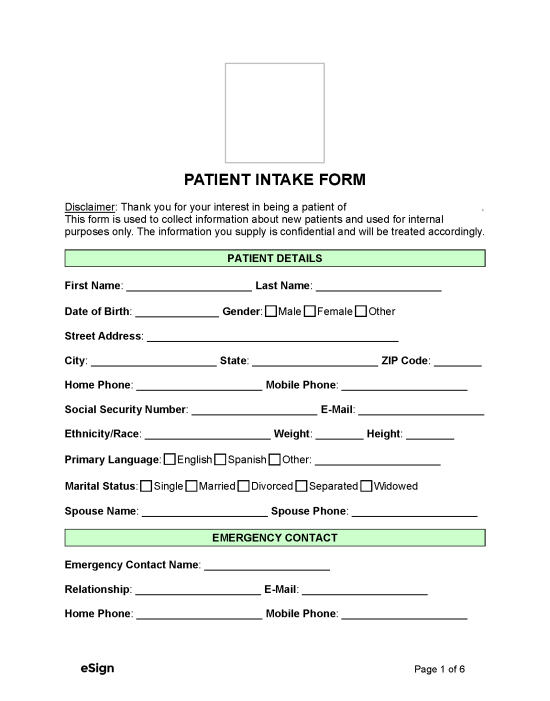

A patient intake form is used by healthcare facilities to collect a patient’s personal information and medical history. The form requires new patients to answer questions and provide information so that healthcare providers can assess their needs, identify health risks, design an effective treatment plan, and keep up-to-date records for future reference. By signing, the patient grants the healthcare facility permission to access their medical records and use the information for billing and treatment.
This section lists the patient’s name, contact information, weight, height, preferred language, and Social Security number. Patients might also be asked to specify their ethnicity/race and marital status.
The patient must provide the name and phone number of someone who can be contacted in an emergency. The emergency contact is typically a spouse, child, or other relation who lives near the patient’s residence.
Patients with health insurance must enter the policy number, group number, and insurance type (e.g., HMO, PPO). If the patient is covered under someone else’s insurance, the form must identify the policyholder and mention that person’s name, contact details, SSN, and relationship to the patient.
The healthcare facility will ask the patient to provide their primary care physician’s name and phone number. If other physicians provide specialized care, those individuals should also be mentioned along with their specialty (e.g., chiropractic, dermatology).
Patients must state their allergies, medications, family health history, and previous illnesses or surgeries. Sharing this information allows healthcare providers to make a more accurate diagnosis and implement better solutions for the patient’s treatment.
In this portion of the form, the patient can explain their recent health issues, their symptoms, how long they’ve experienced problems, and how severe their pain is.
Healthcare facilities will ask patients to reveal certain details about their lifestyle and social habits, including whether they drink alcohol, smoke, use drugs, or exercise regularly.
Patients usually fill out an intake form when first visiting a clinic or hospital. The healthcare facility’s receptionist or intake coordinator will evaluate the completed form before inputting the patient’s information into the facility’s database.
An intake form is also used when a patient starts seeing a specialist or changes doctors. The form promotes a seamless transition of care by giving the healthcare provider insight into the patient’s medical history, ongoing treatments, and current medications.
Providers can have returning patients complete an intake form to update their health care information . For instance, if a patient changes insurance policies, begins taking medication, or receives a diagnosis from another physician, this information should be relayed in an intake form.
Most healthcare facilities have an obligation under the Health Insurance Portability and Accountability Act of 1996 (HIPAA) to notify patients how their medical information will be used and shared. This notice, called a Notice of Privacy Practices, should be made available during patient’s the first appointment.